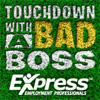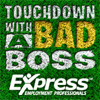At some point in your job search or career, you may be invited to a job interview over breakfast, lunch, or dinner. While meal times are usually relaxing and entertaining, business-related dining for a job interview is more professional and employers use the opportunity to test an applicant’s social skills. If you’re nervous about attending a job interview over lunch or dinner, don’t panic. Use these tips to help improve your dining etiquette and get the job.
Arrive early. Many lunch interviews will take place during office hours, so interviewers may be pressed for time to get back to the office. Be respectful of their time and show up when expected.
Dress appropriately. Even though you might be in a casual restaurant, be sure to dress appropriately for the interview. For instance, you might wear a suit if you’re applying for a more professional job or a nice pair of slacks if it’s an industrial job. Depending on what kind of job you’re applying for, make sure you find out what is appropriate for that specific field.
Turn off cell phone. You’re making a first impression from the minute you step into the restaurant. Stay focused on why you’re there. To avoid possible distractions while dining, it’s best to leave your cell phone in the car during an interview. If you’re expecting an emergency phone call, be cautious and let your host know in advance. If you must take your phone with you, put it on silent.
Make conversation. Prior to your interview, gather as much information as you can and talk with the interviewer about what you know about their company and their job. It’s easy to get nervous during an interview, but don’t let that prevent you from being conversational. Chat with your interviewer as you’re ordering your food.
Use good manners. Be sure to sit up straight and engage yourself with your surroundings. Don’t slouch on the table. Since it’s an interview, you’re going to get a lot of questions so avoid talking with a mouth full of food. Also, avoid ordering food like spaghetti or lobster so you don’t make a mess, and remember to keep your elbows off the table.
Follow the interviewers lead. Mirror the body language of your host. If they lean forward, do so too. Also, follow their lead when ordering your food. Stay within the price range of your host, but if your host asks you to go ahead and order first, pick something that isn’t too expensive. Also, be sure to make your food choice quickly. Don’t spend a lot of time trying to decide what you want to order. Remember the reason you’re there is to interview, not to hang out with friends.
Be polite. Don’t be rude to a server or restaurant staff because it will reflect badly on you. Don’t forget your host is watchful of your behavior so be sure to say please and thank you when necessary.
Send a follow-up thank-you note. In a situation where you and other candidates may possess equal qualifications for a job, a thank-you note can be used as a tie breaker. So, after your lunch or dinner, be sure to follow up with a thank-you note.
Most interviews conducted during a breakfast, lunch, or dinner setting are a little different than being in the interviewer’s office. These interviews can reveal your social skills and how you act in situations other than the business environment. Remember that confidence goes a long way in every interview so be sure to smile and maintain eye contact when necessary. Relax, enjoy the food and company, and show potential employers that you’re the perfect match for the position you’re interviewing for.



